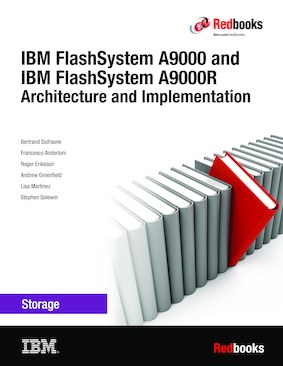
Published on 29 January 2019, updated 10 June 2019
Read in Google Books
Share this page:
ISBN-10: 073845740x
ISBN-13: 9780738457406
IBM Form #: SG24-8345-03
Authors: Bert Dufrasne, Francesco Anderloni, Roger Eriksson, Lisa Martinez and Stephen Solewin
Abstract
* Version 12.3.2 *
This IBM® Redbooks publication presents the architecture, design, concepts, and technology that are used in IBM FlashSystem® A9000 and IBM FlashSystem A9000R.
FlashSystem A9000 and FlashSystem A9000R deliver the microsecond latency and high availability of IBM FlashCore® technology with grid architecture, simple scalability, and industry-leading IBM software that is designed to drive your business into the cognitive era. The Hyper-Scale Manager highly intuitive user interface simplifies management.
Comprehensive data reduction capabilities, including inline deduplication and a powerful compression engine, help lower total cost of ownership.
With software version 12.3.1 and Hyper-Scale Manager version 5.5.1 (or later) the system can compute reclaimable and attributed capacity information, without performance impact.
Software version 12.3.2, with Hyper-Scale Manager version 5.6 or later, introduces support for VLAN tagging and port trunking.
From a functional standpoint, FlashSystem A9000 and FlashSystem A9000R take advantage of most of the software-defined storage features that are offered by the IBM Spectrum™ Accelerate software, including multi-tenancy and business continuity functions. FlashSystem A9000 and FlashSystem A9000R supports HyperSwap and Multi-site High Availabilty / Disaster Recovery (HA/DR) configurations.
This publication is intended for those individuals who need to plan, install, tailor, and configure FlashSystem A9000 and FlashSystem A9000R.
For detailed information about configuration, management, host attachment, and replication functions and their usage, see the following publications:
Table of Contents
Chapter 1. IBM FlashSystem A9000 and IBM FlashSystem A9000R
Chapter 2. Logical architecture and concepts
Chapter 3. Hardware and technology
Chapter 4. Capacity planning and management
Chapter 5. Installation requirements
Chapter 6. Performance
Chapter 7. Monitoring and troubleshooting